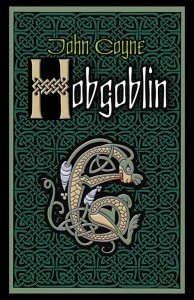
John Coyne
Dover Publications
November, 2015
Reviewed by Josh Black
Originally published in 1981 by G.P. Putnam’s Sons, this edition of Hobgoblin is a reprint from Dover. Here’s their description from the back cover:
Ancient magic meets contemporary horror in this thrilling tale of a young man’s obsession. Scott Gardiner is already shattered by the demise of his character in a sword-and-sorcery fantasy. When his father dies at almost exactly the same moment, the line between nightmare and reality begins to erode.
Scott and his mom attempt to start over by moving to Ballycastle, a medieval Irish manor house rebuilt on the banks of the Hudson. A new role-playing game captures Scott’s imagination: Hobgoblin, in which he takes on the identity of the legendary Irish hero Brian Borù. Before long, he’s seeing a black annis – a terrifying creature of Celtic myth – darting about the estate. Scott plunges deeper and deeper into the dreamlike allure of Hobgoblin until more than just his sanity is at stake and he is forced to rescue others from a dark power.
That description isn’t exactly accurate, and the “thrilling tale” bit may just have been accidentally printed on the wrong book. If you pick up this one looking for a terrifying ordeal or even a few cheap thrills, you’ll come out of it sorely disappointed.
What you will get is a hackneyed plot populated by flat characters whose motivations are questionable at best, and nonsensical at worst (which is most of the time). Everything anyone says or does is seemingly meant to extend the page count to that magic number where the plot can be resolved with a nice and tidy Scooby Doo conclusion. The characters are unrealistic across the board, and for much of the book they’re just stumbling into the right place at the right time. Suspension of disbelief is nearly impossible to maintain, even though there’s hardly a whiff of the supernatural to be found here, despite the “dark power” mentioned. Add to this the fact that Coyne eschews the “show don’t tell” rule for almost the entire book and you’ve got a recipe for disaster. Disaster isn’t far off the mark.
Some parts are almost interesting. There’s a subplot involving a couple of bullies that would have worked well had it been handled better. There’s a bit of the history of Dungeons & Dragons tossed in, but again, it comes across as padding. The occasional segue into Irish mythology breaks up the monotony of the rest, but it’s not enough to make up for it. A couple of images might stick with you, but at 307 pages, a couple of images likely aren’t going to cut it.
Bottom Line: this doesn’t work as fantasy or horror. If you’re looking for a good read in either genre, or something that combines the two in a way that’s worth your time, look elsewhere. Leave Hobgoblin back in the 80s where it should have stayed.








